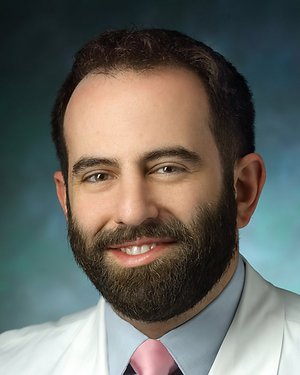
Matthew Robinson, MD
Infectious Diseases
Highlights
Johns Hopkins Affiliations:
- Johns Hopkins School of Medicine Faculty
About Matthew Robinson
Primary Academic Title
Assistant Professor of Medicine
Johns Hopkins Physician

Background
Matthew Robinson, MD, is Assistant Professor in the Division of Infectious Diseases at Johns Hopkins University School of Medicine. He is interested in leveraging diagnostic innovation and precision medicine to reduce diagnostic and prognostic uncertainty for infectious diseases. His current projects include applications in global health, antimicrobial resistance, antibiotic stewardship, infection control, COVID-19, acute febrile illness, and tuberculosis.
After undergraduate and medical school at Northwestern University, he completed internal medicine residency at New York University and Infectious Diseases fellowship at Johns Hopkins School of Medicine. During medical school, he worked at the Chinese Center for Disease Control and Prevention in Beijing, China under a Doris Duke International Clinical Research Fellowship. He also served as a clinician educator in internal medicine in Gulu, Uganda at the Gulu University Faculty of Medicine as a Global Health Service Partnership volunteer. As a fellow, he pursued a Fogarty Global Health Fellowship in Pune, India and an Antibacterial Resistance Leadership Group Fellowship.
Since joining the faculty in 2019, Dr. Robinson has been supported by the Centers for Disease Control and Prevention, National Institutes of Health, and Food and Drug Administration. The focus of his work in antimicrobial resistance, antibiotic stewardship, infection control has been to characterize drug-resistant Gram-negative infections in India. His work with the Johns Hopkins Precision Medicine Center of Excellence for COVID-19 has included applying machine learning and causal inference techniques to predict COVID-19 outcomes. He has contributed to SARS-CoV-2 diagnostic development through the NIH Rapid Acceleration of Diagnostics (RADx) initiative and through collaborative development of other novel diagnostics.
Centers and Institutes
Clinical Global Health Education, Center for
Google Scholar
Selected Publications
Robinson ML, Kadam D, Kagal A, Khadse S, Kinikar A, Valvi C, Basavaraj A, Bharadwaj R, Marbaniang I, Kanade S, Raichur P, Sachs J, Klein E, Cosgrove S, Gupta A, Mave V. Antibiotic Utilization and the Role of Suspected and Diagnosed Mosquito-borne Illness Among Adults and Children With Acute Febrile Illness in Pune, India. Clin Infect Dis 2018; 66(10): 1602-9. doi:10.1093/cid/cix1059
Robinson ML, Kadam D, Khadse S, Balasubramanian U, Raichur P, Valvi C, Marbaniang I, Kanade S, Sachs J, Basavaraj A, Bharadwaj R, Kagal A, Kulkarni V, Zenilman J, Nelson G, Manabe YC, Kinikar A, Gupta A, Mave V. Vector-Borne Disease is a Common Cause of Hospitalized Febrile Illness in India. Am J Trop Med Hyg 2018; 98(5): 1526-33. doi:10.4269/ajtmh.17-0571
Bharadwaj R, Robinson ML, Balasubramanian U, Kulkarni V, Kagal A, Raichur P, Khadse S, Kadam D, Valvi C, Kinikar A, Kanade S, Suryavanshi N, Marbaniang I, Nelson G, Johnson J, Zenilman J, Sachs J, Gupta A, Mave V. Drug-resistant Enterobacteriaceae colonization is associated with healthcare utilization and antimicrobial use among inpatients in Pune, India. BMC Infect Dis 2018; 18(1): 504. doi:10.1186/s12879-018-3390-4
Shrock E, Fujimura E, Kula T, Timms RT, Lee IH, Leng Y, Robinson ML, Sie BM, Li MZ, Chen Y, Logue J, Zuiani A, McCulloch D, Lelis FJN, Henson S, Monaco DR, Travers M, Habibi S, Clarke WA, Caturegli P, Laeyendecker O, Piechocka-Trocha A, Li JZ, Khatri A, Chu HY, Collection MC-, Processing T, Villani AC, Kays K, Goldberg MB, Hacohen N, Filbin MR, Yu XG, Walker BD, Wesemann DR, Larman HB, Lederer JA, Elledge SJ. Viral epitope profiling of COVID-19 patients reveals cross-reactivity and correlates of severity. Science 2020; 370(6520): eabd4250. doi:10.1126/science.abd4250
Wongvibulsin S, Garibaldi BT, Antar AAR, Wen J, Wang MC, Gupta A, Bollinger R, Xu Y, Wang K, Betz JF, Muschelli J, Bandeen-Roche K, Zeger SL, Robinson ML. Development of Severe COVID-19 Adaptive Risk Predictor (SCARP), a Calculator to Predict Severe Disease or Death in Hospitalized Patients With COVID-19. Ann Intern Med 2021; 174(6): 777-85. doi:10.7326/M20-6754
Locations
- The Johns Hopkins Hospital
- 1800 Orleans Street, Baltimore, MD 21287
- phone: 410-955-5000
- fax: 410-955-5001
Expertise
Education
Johns Hopkins University School of Medicine
Fellowship, Infectious Diseases, 2018NYC Health+Hospitals/Bellevue
Residency, Internal Medicine, 2013Northwestern University Feinberg School of Medicine
Medical Education, MD, 2010Board Certifications
Infectious Disease
American Board of Internal Medicine, 2017Internal Medicine
American Board of Internal Medicine, 2014Insurance
- Aetna
- CareFirst
- Cigna
- First Health
- Geisinger Health Plan
- HealthSmart/Accel
- Humana
- Johns Hopkins Health Plans
- MultiPlan
- Pennsylvania's Preferred Health Networks (PPHN)
- Point Comfort Underwriters
- Private Healthcare Systems (PHCS)
- UnitedHealthcare
- Veteran Affairs Community Care Network (Optum-VACCN)
